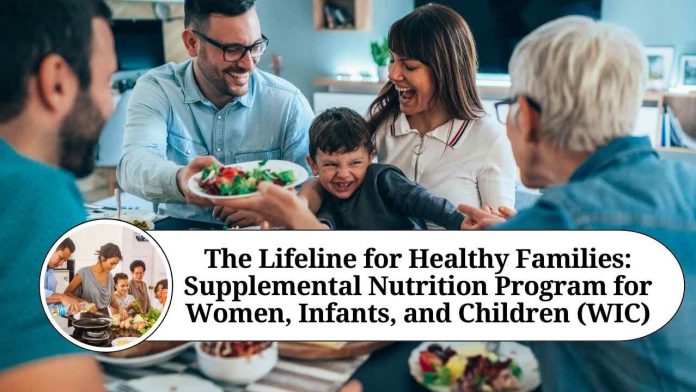Introduction
In an ideal world, every family would have access to nutritious food that supports their overall health and well-being. However, the reality is that many families, especially those with women, infants, and young children, face financial constraints that make it difficult to meet their nutritional needs. Thankfully, the United States government has implemented the Supplemental Nutrition Program for Women, Infants, and Children (WIC) to bridge this gap and ensure the optimal health of vulnerable populations. In this blog, we will explore the significance of WIC, how it works, and its impact on the lives of countless families.
Understanding WIC:
The Supplemental Nutrition Program for Women, Infants, and Children (WIC) is a federally-funded program in the United States that provides nutritious food, education, and support to low-income pregnant women, new mothers, and young children up to the age of five. The primary goal of WIC is to improve the health outcomes of vulnerable populations by addressing their nutritional needs during critical stages of growth and development.
Eligibility and Enrollment:
To be eligible for WIC, individuals must meet certain criteria, including income guidelines and nutritional risk factors. The program targets low-income families, and eligibility is determined by household size and income level. Additionally, individuals must have a nutritional risk, which can be identified through a health screening process conducted by healthcare professionals. Once deemed eligible, families can enroll in the program and begin to receive the benefits provided by WIC.
Program Benefits:
WIC provides a comprehensive range of benefits designed to support the nutritional needs of women, infants, and children. These benefits include:
- Nutritious Food Packages: Participants receive vouchers or electronic benefit transfer (EBT) cards that can be used to purchase a variety of healthy foods, including fruits, vegetables, whole grains, dairy products, and infant formula. The program emphasizes the importance of a balanced diet and encourages the consumption of key nutrients necessary for growth and development.
- Nutrition Education: WIC offers nutrition education classes and counseling sessions to help participants make informed choices about their diet and develop healthy eating habits. This education extends beyond the immediate beneficiaries to empower entire families with the knowledge to make nutritious choices.
- Breastfeeding Support: WIC promotes and supports breastfeeding as the optimal source of nutrition for infants. Trained counselors provide guidance, education, and resources to help mothers successfully initiate and continue breastfeeding. For those who cannot breastfeed, the program offers access to formula.
- Healthcare Referrals: WIC works in collaboration with healthcare providers to ensure participants have access to necessary medical services. The program facilitates referrals for immunizations, prenatal care, and other healthcare needs, thereby promoting holistic well-being.
Impact on Families:
The impact of WIC on families is profound and far-reaching. By addressing the nutritional needs of pregnant women, new mothers, and young children, WIC plays a vital role in preventing nutritional deficiencies and related health complications. Studies have shown that WIC participation leads to improved birth outcomes, reduced risk of premature birth, increased likelihood of regular healthcare visits, and improved overall diet quality among children. Moreover, the program has been linked to long-term positive effects, such as better academic performance and improved economic self-sufficiency.
Conclusion
The Supplemental Nutrition Program for Women, Infants, and Children (WIC) stands as a testament to the commitment of the United States government towards the health and well-being of its most vulnerable citizens. By providing access to nutritious food, nutrition education, and essential support services, WIC has become a lifeline for countless families.
Read more useful content:
Frequently Asked Questions (FAQs)
Q. What is WIC, and who is eligible to participate?
WIC stands for the Supplemental Nutrition Program for Women, Infants, and Children. It is a federally-funded program in the United States that provides nutritious food, education, and support to low-income pregnant women, new mothers, and young children up to the age of five. Eligibility is based on income guidelines and nutritional risk factors.
Q. How do I know if I qualify for WIC?
Eligibility for WIC is determined by household size and income level. You can check the income guidelines provided by your local WIC agency or visit their website for specific details. Additionally, individuals must have a nutritional risk, which can be identified through a health screening process conducted by healthcare professionals.
Q. What benefits does WIC provide?
WIC offers a range of benefits, including vouchers or electronic benefit transfer (EBT) cards that can be used to purchase a variety of nutritious foods such as fruits, vegetables, whole grains, dairy products, and infant formula. The program also provides nutrition education, breastfeeding support, and healthcare referrals.
Q. How do I apply for WIC?
To apply for WIC, you need to contact your local WIC agency. They will provide you with information on the application process, required documentation, and appointment scheduling. Typically, the application involves filling out forms, providing proof of income and residency, and participating in a health screening.
Q. Can I participate in WIC if I am already receiving other government assistance programs?
Yes, you can participate in WIC even if you are receiving other government assistance programs such as SNAP (Supplemental Nutrition Assistance Program) or Medicaid. Eligibility for each program is determined separately, and receiving benefits from one program does not disqualify you from receiving benefits from another.
Q. Can WIC help with breastfeeding support?
Yes, WIC provides comprehensive breastfeeding support. The program promotes and supports breastfeeding as the optimal source of nutrition for infants. Trained counselors offer guidance, education, and resources to help mothers successfully initiate and continue breastfeeding. For those who cannot breastfeed, the program offers access to formula.
Q. Is WIC only about providing food?
No, WIC goes beyond providing food. It also focuses on nutrition education. WIC offers nutrition classes and counseling sessions to educate participants about healthy eating habits, making informed food choices, and preparing nutritious meals. The program aims to empower families with the knowledge and skills to maintain a healthy diet.
Q. What other services does WIC provide?
Along with food and nutrition education, WIC provides healthcare referrals. This means that WIC works in collaboration with healthcare providers to ensure participants have access to necessary medical services. The program facilitates referrals for immunizations, prenatal care, and other healthcare needs, promoting overall well-being.
Q. Can fathers or guardians participate in WIC?
While WIC primarily targets pregnant women, new mothers, and young children, fathers or legal guardians can also participate in WIC on behalf of their children. The program recognizes the importance of family involvement in promoting the health and nutrition of infants and children.
Q. How long can I receive WIC benefits?
The duration of WIC benefits varies depending on the individual’s specific circumstances. Typically, pregnant women can receive benefits until six weeks after giving birth, and infants and children can receive benefits until they reach their fifth birthday. Participants need to reapply periodically to determine continued eligibility.




















